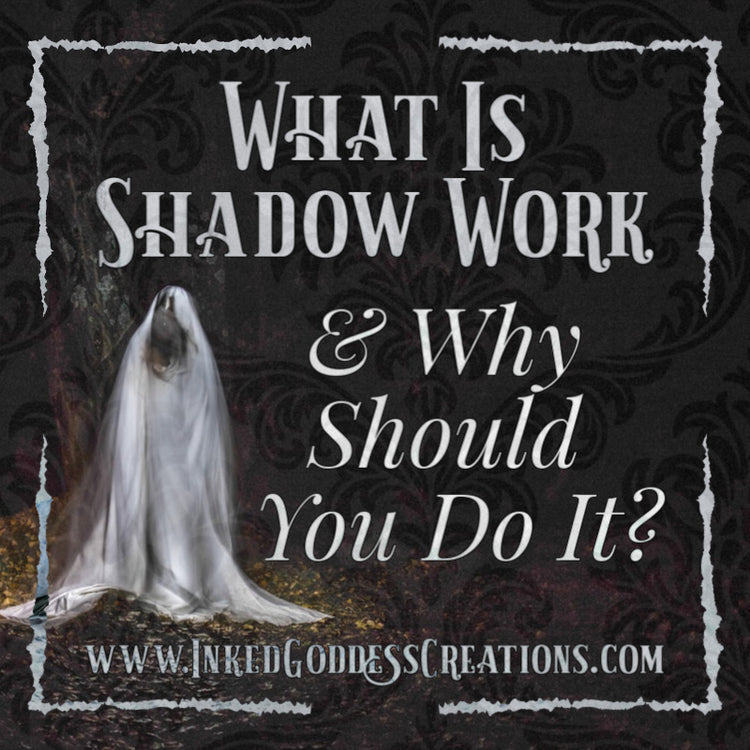What Is Shadow Work & Why Should You Do It?

The shadow self – sometimes simply called our shadow – is the unconscious part of the brain, which drives a large amount of our behavior. Automatic responses to triggers, deep-seated habits, and emotional patterns “live” in this shadow self. But as we progress in our spiritual paths, it’s important not to suppress or ignore our shadow self in our efforts for self-improvement.
What is the Shadow Self?
The concept of the shadow self comes from Jungian psychology. Carl Jung was a colleague of Sigmund Freud – but don’t let that dissuade you from his theories! Taking Freud’s concepts of the conscious and subconscious mind a step further, Jung identified the disowned, shamed parts of our mind as our “dark side” and often spoke of our repressed desires as the “shadow.” Today, we understand that shadow work tackles the challenging tasks of fixing old patterns and acknowledging our darker and more wicked sides as part of a larger whole.
What is Shadow Work?
Shadow work is, quite simply, the inner work that must be done for you to progress to the next level of your spirituality. It’s a never-ending process, though, because as anyone who has done shadow work will tell you, the more you do, the more you need to do. But with each limiting belief that you knock down, you grow spiritually.
We’ll dive into some of the specifics on how to do shadow work in a bit, but for now, it’s important to understand why shadow work is so important. As you work with your dark side and acknowledge its desires, fears, and tendencies, you’ll help prevent or correct a variety of issues including:
- Social anxiety
- Uncontrollable anger and outbursts
- Limiting beliefs
- Arrogance
- Problems with other people
- Neurotic behaviors
- Self-sabotaging and second-guessing yourself
Essentially, when we don’t address ourselves as a whole, negative things happen, and it’s hard to feel aligned and grounded. Jung may have said it best in his work, Psychology and Religion:
“Everyone carries a shadow, and the less it is embodied in the individual’s conscious life, the blacker and denser it is. If an inferiority is conscious, one always has a chance to correct it. Furthermore, it is constantly in contact with other interest, so that it is continually subjected to modifications.”
If we push those feelings to the background, they can become part of our subconscious and are never corrected.
Shadow work is not a substitute for therapy, however. Just because you’re working spiritually and magickally on your dark side does not mean that you should ignore a professional’s diagnosis or advice. With that said, here’s how to do it:
How to do Shadow Work
If you’re ready to start shadow work, the first step is to recognize that no emotion is actually bad…they can just be unwanted. That’s right! Despite what society – or your mom – told you, anger, irritation, sadness, and hopelessness aren’t bad. They’re not only natural human emotions, but they’re also signs that something’s not right in your world, which makes them extremely useful.
Through these emotions, we can access the shadow self. So, when you find yourself experiencing an undesirable emotion, ask yourself one or more of the following questions:
- What am I feeling?
- Why am I feeling this way?
- Could there be something else going on here?
Journaling can be exceptionally useful during shadow work. As you continue to investigate your emotional tendencies, you might notice patterns in your behavior. Where do you begin to self-sabotage? It might be in your love life, with work successes, or practicing an artistic hobby. How many artists have claimed to be “not good enough” to share their work?
Identifying the Shadow
It can be difficult to identify the shadow self, but a sure sign of its reemergence are limiting “I am” statements that creep into your speech. Look out for phrases like:
- I’m not good enough.
- I’m messed up.
- I’m unlovable.
- I’m a screw-up.
The statements can also come in the form of autobiographical statements that don’t begin with “I am,” like: “Nobody cares about me,” “My feelings aren’t valid,” or “I have to take care of everyone else.”
As you press forward to identify your shadow self, do so with compassion. Our shadow selves often develop out of trauma and bad experiences. Using your conscious thoughts to deride your subconscious ones will lead you into a deeper, darker hole.
We’ve already mentioned journaling as a useful tool in shadow work, but others like meditation and spellwork can help you address your less-desirable emotions and habits. We’ve put together another list of tools that can assist you in your shadow work and invite you – as always – to add your own magick to the practice.
Helpful Herbs and Resins for Shadow Work
Try integrating one or more of the following herbs into your shadow work.
- Sage for clearing
- Lavender for stress release
- Chamomile for relaxation
- Rosemary for healing, protection, and cleansing
- Lemongrass for uplifting
- Eucalyptus for strength
- Cinnamon for love
- Myrrh for peace
Crystals for Shadow Work
Crystals and gemstones are especially helpful during shadow work since they give you something physical to hold onto while working.
- Labradorite for shadow work
- Selenite for aura cleansing
- Fluorite for self-confidence
- Sodalite for serenity
- Amethyst for balance and stress relief
Remember, your shadow self is like a little kid version of you. It wants to be loved, at peace, and acknowledged. As you work with your shadow side, bear these things in mind, and love yourself through the process.
